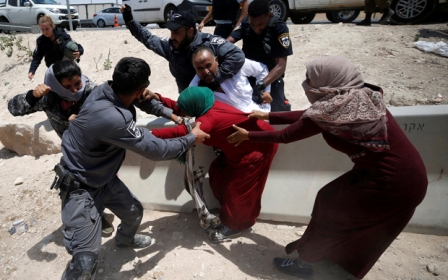Khan al-Ahmar: Israel's top court freezes demolition of Palestinian village

Israel's Supreme Court ordered late on Thursday a pause on the demolition of the Palestinian Bedouin town of Khan al-Ahmar in the occupied West Bank, Israeli media outlets reported.
Israel has faced mounting international condemnation as its security forces continued preparations to demolish the town.
On Wednesday morning, Israeli soldiers cracked down on activists who had come to support the town's residents, injuring 35, four of whom were hospitalised. Thirteen people were arrested, including a teenage girl, a PLO official said.
The High Court had upheld the demolition order against the town of 180 residents in May.
The suspension was issued on Thursday to examine claims about the ownership of the land. A judge gave the Israeli government until 11 July to challenge the injunction.
Save the Children country director Jennifer Moorehead highlighted in a statement on Friday that the injunction mean little more than a postponement of the demolition.
“The school and community of al Khan al-Ahmar have received a last minute reprieve for possibly a few days. But the legal options for this community have been exhausted," she said. "The community is terrified that the bulldozers will be back.
“This community has already suffered so much and the impending threat of demolition is having a huge impact on the psychological wellbeing of the children," she added, noting that Khan al-Ahmar is home to school that serves some 170 Palestinian children living in Bedouin communities in the area.
Israel regularly demolishes Palestinian homes and schools in the West Bank, arguing that they are built without permits.
However, Human Rights Watch notes that "the Israeli military refuses to permit most new Palestinian construction in the 60 percent of the West Bank where it has exclusive control over planning and building, even as the military facilitates settler construction".
Palestinian activists and officials say the scheme to displace Palestinian residents in the area aims to expand illegal settlements, isolate East Jerusalem from Palestinian communities in the West Bank, as well as to effectively cut off the southern and northern West Bank, forcing Palestinians to make even lengthier detours to travel from one place to another.
Walid Assaf, head of the National Committee to Resist the Wall and Settlements, credited activists on the ground for the injunction. He also thanked foreign diplomats and lawyers who worked on the case and visited the community regularly in support.
"We will persist here until a final decision is issued," Assaf was quoted as saying by official Palestinian news agency Wafa.
The Israelis are racist, they do not want any Palestinians in this area, because it is the gateway to East Jerusalem.
- Yusuf Abu Dawoud, Khan al-Ahmar resident
In a statement published by the PLO's Negotiations Affairs Department on Thursday, Khan al-Ahmar residents had called on the international community to "hold Israel accountable for its crimes".
"The issue of Khan al-Ahmar illustrates Israel’s objective of widespread and systematic forcible displacement of Palestinians and replacement with Israeli settlers, as part and parcel of Israel’s broader scheme of creeping annexation," the statement said.
"Though various in form, these policies and practices share a common underlying force: the forcible transfer of Palestinians based on their ethnicity, under the semblance of legality."
On Thursday, prior to the court's decision, the United Nations warned that displacing Palestinian villagers has "serious human rights and humanitarian law consequences".
"The latest developments are of serious concern as it is evident that they are undertaken with the objective of relocating the concerned communities, as well as causing serious distress to the vulnerable residents who are watching what appear to be preparations for the demolition of their community," Scott Anderson, the director of operations in the West Bank for the UN agency for Palestinian refugees, UNRWA, said in a statement.
"These pastoral communities are mostly Palestine refugees – originally displaced from their tribal lands in the Negev. They should not be forced to experience a second displacement against their will."
Many European countries have also called on Israel to halt the demolitions. On Thursday envoys from France, Sweden, Belgium, Italy, Ireland, Switzerland, Finland, Spain and the European Union visited the area but Israeli police denied them access to a school funded by several European countries.
"We wanted to show our solidarity to this village which is threatened with destruction, for reasons both humanitarian (...) and because it is a major issue of international law," said the consul general of France in Jerusalem, Pierre Cochard.
"This is a very clear violation of the Fourth Geneva Convention which determines the obligations of the occupying powers in the occupied territories," he added.
Villagers have vowed not to abandon their land.
Yusuf Abu Dawoud, a 37-year-old resident of Khan al-Ahmar, told Middle East Eye on Wednesday that Israeli forces and bulldozers were beginning to attack the village "without any humanity".
"The Israelis are racist, they do not want any Palestinians in this area, because it is the gateway to East Jerusalem," he said. "They want to erase Jerusalem from any Palestinian heritage and influence. They want to kick us out of our lands, but we will stay."
Stay informed with MEE's newsletters
Sign up to get the latest alerts, insights and analysis, starting with Turkey Unpacked
Middle East Eye delivers independent and unrivalled coverage and analysis of the Middle East, North Africa and beyond. To learn more about republishing this content and the associated fees, please fill out this form. More about MEE can be found here.






